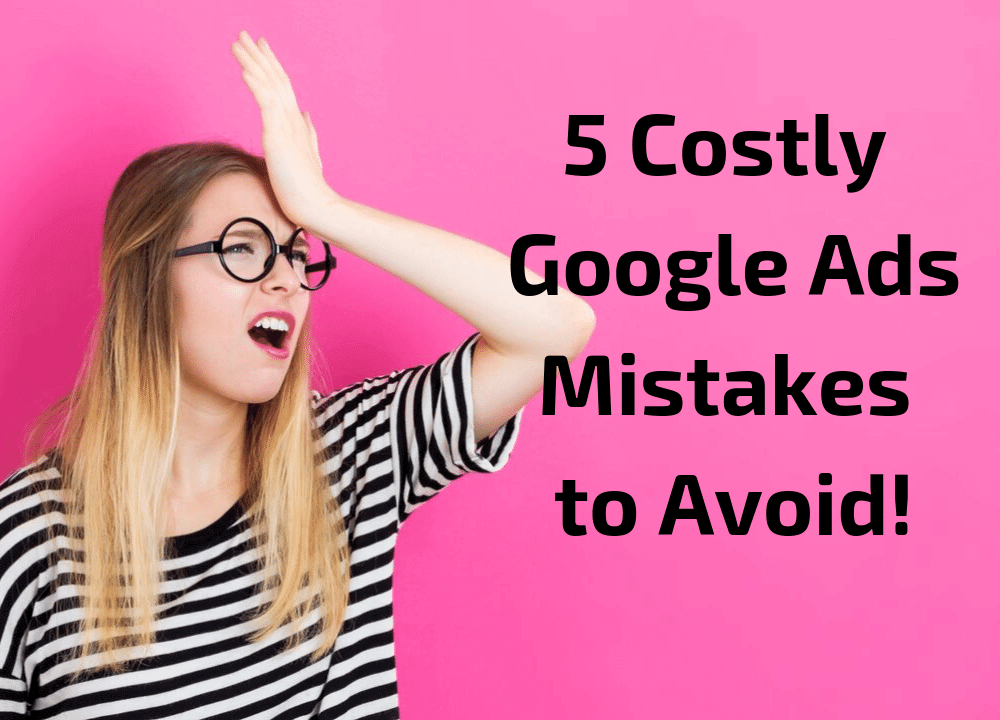5 Costly Google Ads Mistakes to Avoid!

When setting up a Google Ads campaign there are a number of pitfalls that many advertisers fall into and this ends up costing them a lot of money in wasted ad spend.
I often see the same mistakes made time and time again the accounts that I review, so here are the five costly Google Ads Mistakes to Avoid.
If you can avoid these five Google Ads mistakes it will help to save you from wasting your money, your time, and seeing poor performance within your campaigns.
Remember: even if the channel you’re considering is all the rage right now, it might not fit your brand. Always make informed decisions that directly relate to your company. Otherwise, your message won’t be delivered to its intended audience and you’ll have wasted time, effort and money.
1. No Negative Keywords
The first mistake is having none or a lack of negative keywords within your campaign.
Negative keywords act as a filter for non-relevant search terms, effectively blocking out clicks from terms which are not related to your product or service.
Having negative keywords helps to prevent your ads from being served to people who are not interested in your what you’re offering; and having a lack of negative keywords can lead to your budget being wasted on traffic from the wrong type of visitors.
Coming up with a comprehensive list of negative keywords and applying this to your campaign before you go live is a good idea to avoid wasting a lot of your advertising budget.
2. Using Broad Match Keywords
There are a number of different types of keywords, which target a different spectrum of search terms.
The different match types are listed below with a the keyword “Google Ads” used as an example:
Exact Match
How it looks: [Google Ads]
What it targets: Only the exact keyword at it appears, or close variants.
Example of Terms Targeted: “Google Ads”, “Google Ad”.
Phrase Match
How it looks: “Google Ads”
What it targets: Any keyword that contains “Google Ads”, in that word order.
Example of Terms Targeted: “Google Ads tutorial”, “I need help with Google Ads”
Broad Match Modified
How it looks: +Google +Ads
What it targets: Keywords that include the words that have a plus sign next to them, in any word order.
Example of Terms Targeted: “How do I place Ads on Google”, “What are the Google Ads best practices”
Broad Match
How it looks: Google Ads
What it targets: Any term deemed by the Google algorith to be related to Google Ads, but this term does not need to contain the word “Google” or “Ads”.
Example of Terms Targeted: “pay per click advertising”, “bing Ads”.
From the above examples you can see that as we go down in the list of match types, the targeting becomes far less restrictive. As a result of this a wider spectrum of terms are targeted, with the Broad Match keyword targeting the widest spectrum.
In the example, if you were intending on targeting only terms closely connected to and based around Google Ads, then you would have the unintended result of targeting terms related to “pay per click marketing”, “Bing Ads”, and a long list of other terms.
This could result in a waste of your advertising budget.
For this reason it is best to not use Broad Match keywords unless you desire a very expansive (and expensive) form of targeting.
3. Location Settings
A very common issue that I often see within campaigns is in the location settings.
There is a very important option within the advanced settings which is overlooked because the setting is very obscure.
This option gives advertisers a choice between:
“Target people who are in, and who show an interest in my target location”
and
“Target people who are in, or who are often in my target location”.
The difference between these two settings may seem somewhat subtle, but it is extremely influential on the performance of your campaign.
The former setting (which is recommended by Google) allows your ads to show in countries other than the one you have selected for targeting.
For example if you selected the USA as your target location, your ads can show to a person within Australia, or within Russia, or anywhere else in the world, if they have an interest in the USA.
This can of course result in wasted ad spend.
To save money, simply select the latter option.
4. Poor Landing Page
Having a poor landing page is another common mistake which can result in a large amount of wasted ad spend.
What is a poor landing page you say?
Before you have adequate data to confirm whether your landing page is effective or not, it can be difficult to know whether your landing page is going to be successful. Whether a page is good or not can be very subjective.
However, if you are unsure, ask yourself the following questions:
- Does my landing page have a clear call to action? If not then it is likely that visitors will find it difficult to know what to do next to get in contact or purchase your product or service.
- Is my home page my landing page? Your website home page may be the best option for organic traffic, but is it the most relevant page for your paid search campaign?
- Does my page talk about the features or advantages of my product or service? It’s imporant that visitors are given enough informaton to make a buying decision.
- Does my page load quickly? These days visitors are not in the habit of waiting, if your page doesn’t load within 1-2 seconds, they might not stick around.
If you think your landing page might not be up to scatch, it’s definitely worth investing in making some improvements early on, because if your page enage your visitors and convert them, then it could up costing you a lot more in wasted ad spend.
5. No Conversion Tracking
Conversion tracking can often be overlooked within accounts, but it is absolutely crucial to the success of your campaigns.
Your campaigns need to be tracking when a prospective customer has called you, filled out your contact form, made a purchase, or carried out any other action which represents business value.
Without this it’s very difficult to gauge the success of the campaign and identify the areas which are working well, and those which are not.
A campaign without conversion tracking is therefore likely to end up wasting a lot of money on keywords, or other forms of targeting which are not generating any new clients or sales.
Need Help With Your Google Ads Account?
If you feel your campaigns are not working as effectively as they could, and would like an expert to review your account, then feel free to get in contact with us and we’ll have one of our specialists get in contact with you.

